Motivation Letter For Master Degree
[Your Name]
[Your Address]
[City, State, Zip Code]
[Email Address]
[Phone Number]
[Date]
[Admission Committee/University Name]
[Department/Graduate School Name]
[University Address]
[City, State, Zip Code]
Dear Members of the Admission Committee,
I am writing to express my sincere interest in pursuing a Master's degree in [Your Desired Field of Study] at [University Name]. As an ambitious and dedicated student, I believe that this esteemed institution aligns perfectly with my academic and professional aspirations, and I am eager to contribute to the academic community while advancing my knowledge in the field.
The journey of my academic pursuits has been one characterized by a passion for [Your Field of Study]. Throughout my undergraduate studies in [Your Previous Major] at [Your Previous University], I was exposed to various facets of the subject, and it was during this time that I discovered my fascination with [Your Desired Field of Study]. My coursework in [Specific Coursework] and research experience in [Relevant Research Projects] allowed me to grasp the complexities and potential applications of [Your Desired Field of Study].
During my undergraduate studies, I actively participated in extracurricular activities and academic societies related to [Your Field of Interest]. My involvement in these organizations not only enhanced my leadership and communication skills but also provided me with valuable opportunities to collaborate with individuals from diverse backgrounds. This experience has shown me the power of interdisciplinary collaboration, and I am excited to engage with like-minded peers and expert faculty members at [University Name].
One of the main reasons I am drawn to [University Name] is the exceptional reputation it holds in the field of [Your Desired Field of Study]. I have followed the work of several professors and researchers from your institution, such as [Professor/Researcher Name], whose groundbreaking contributions have inspired me greatly. The prospect of learning from and collaborating with such distinguished academics motivates me to excel in my studies and strive for innovative research.
Moreover, [University Name]'s state-of-the-art facilities and comprehensive curriculum are tailor-made to foster a dynamic learning environment for students. I am particularly interested in the courses such as [Course Name 1], [Course Name 2], and [Course Name 3], as they align perfectly with my research interests and would equip me with the necessary expertise to make significant contributions to the field.
Beyond academic pursuits, I believe that [University Name] offers a vibrant and inclusive campus life, which provides ample opportunities for personal growth and extracurricular involvement. I look forward to being an active member of the [Name of Clubs/Societies] and engaging in community service initiatives to give back to the university and local community.
In conclusion, I am confident that a Master's degree in [Your Desired Field of Study] at [University Name] is the next logical step in my academic journey, and I am committed to dedicating myself fully to excel in my studies. I am eager to contribute my unique perspectives and passion to the academic and social fabric of [University Name]. Thank you for considering my application.
Sincerely,
[Your Name]
Professional Motivation Letter for Master’s Degree
Subject: Application for Master’s Program in [Program Name]
Dear [Admissions Committee],
I am writing to express my interest in the Master’s program in [Program Name] at [University Name]. With a background in [Your Bachelor’s Field] and hands-on experience in [Relevant Work/Research], I am eager to deepen my expertise and contribute to the academic community.
During my undergraduate studies at [University Name], I focused on [Key Courses or Projects] which ignited my passion for [Specific Field/Topic]. I have also gained practical experience in [Internship/Job/Research], which has provided me with the analytical and problem-solving skills necessary for advanced study.
I am particularly drawn to your program because of [Unique Aspects of Program, Faculty, Research Opportunities]. I am confident that this program will equip me with the knowledge and skills to achieve my career goal of [Career Objective].
Thank you for considering my application. I am excited about the possibility of joining [University Name] and contributing positively to its vibrant academic environment.
Sincerely,
[Your Name]
[Contact Information]
Creative Motivation Letter for Master’s Degree
Subject: Application for Master’s Program in [Program Name]
Dear [Admissions Committee],
Ever since I completed my undergraduate degree in [Field], I have been fascinated by the power of [Specific Topic/Field] to transform ideas into reality. Pursuing a Master’s degree at [University Name] represents the next step in a journey driven by curiosity, creativity, and commitment.
My experience with [Project/Research/Internship] has honed my ability to think critically and innovate. I am eager to further explore [Specific Research Interest] under the guidance of distinguished faculty at [University Name]. The interdisciplinary approach of your program aligns perfectly with my desire to merge theory with practice.
I look forward to contributing my perspectives, enthusiasm, and dedication to the academic community at [University Name].
Warm regards,
[Your Name]
[Contact Information]
Heartfelt Motivation Letter for Master’s Degree
Subject: Application for Master’s Program in [Program Name]
Dear [Admissions Committee],
I am writing with great enthusiasm to apply for the Master’s program in [Program Name] at [University Name]. My passion for [Field/Topic] was ignited during my undergraduate studies, where I experienced firsthand the joy of discovery and learning.
Through my involvement in [Relevant Experience], I realized the impact that well-applied knowledge can have on society. This motivates me to pursue advanced studies, develop my skills, and contribute to meaningful projects that address real-world challenges.
Joining [University Name] would be a dream come true, and I am eager to immerse myself fully in its academic and research opportunities.
Sincerely,
[Your Name]
[Contact Information]
Quick Motivation Letter for Master’s Degree
Subject: Master’s Program Application – [Your Name]
Dear [Admissions Committee],
I am applying for the Master’s program in [Program Name] at [University Name]. With a Bachelor’s in [Field] and experience in [Work/Research], I am keen to advance my knowledge and skills.
Your program’s focus on [Specific Aspect] aligns with my career goals of [Objective]. I am confident that my background and motivation will allow me to succeed and contribute positively.
Thank you for your consideration.
Best regards,
[Your Name]
[Contact Information]
Formal Motivation Letter for Master’s Degree
Subject: Application for Admission to Master’s Program in [Program Name]
Dear Members of the Admissions Committee,
I am pleased to submit my application for the Master’s program in [Program Name] at [University Name]. I hold a Bachelor’s degree in [Field] from [University Name] and have accumulated experience in [Relevant Field/Research/Job].
I am particularly interested in [Specific Program Features, Faculty, or Research Areas] and believe that this program will provide the rigorous academic environment required to advance my expertise. My objective is to [Career or Research Goal], and I am committed to contributing to the scholarly community at [University Name].
I would be honored to be considered for admission and am eager to bring my dedication and skills to your program.
Sincerely,
[Your Name]
[Contact Information]
What / Why You Need a Motivation Letter for a Master’s Degree
- Serves as a personal introduction to the admissions committee.
- Demonstrates your motivation, academic background, and professional aspirations.
- Highlights why you are a good fit for the program.
- Supplements transcripts, CVs, and recommendation letters.
Who Should Write a Motivation Letter for a Master’s Degree
- Prospective students applying for Master’s programs.
- Applicants from various academic and professional backgrounds.
- Candidates seeking scholarships or specific research opportunities.
Whom the Motivation Letter Should Be Addressed To
- Admissions Committee of the targeted Master’s program.
- Specific program coordinators or faculty if instructed.
- Scholarship committees or specialized selection panels.
When to Write and Send a Motivation Letter
- Along with your Master’s program application before the deadline.
- When applying for scholarships or research assistantships.
- Prior to interviews if required by the program.
How to Write a Motivation Letter
- Begin with a clear statement of intent and program interest.
- Describe your academic background and relevant experiences.
- Explain your professional goals and how the program aligns with them.
- Maintain a tone consistent with the program’s culture: formal, professional, or creative.
- Close by expressing enthusiasm and readiness to contribute.
Requirements and Prerequisites Before Writing
- Academic transcripts and degree certificates.
- Resume or CV highlighting professional and research experience.
- Understanding of program curriculum, faculty, and research focus.
- Clarity on personal career goals and motivations.
Formatting Guidelines for Motivation Letters
- Length: Typically 1–2 pages.
- Tone: Professional, sincere, and enthusiastic.
- Style: Clear, structured, and grammatically correct.
- Attachments: Resume, transcripts, and recommendation letters as needed.
- Mode: PDF or Word document as per application instructions.
After Sending / Follow-up Actions
- Confirm receipt if the application portal allows.
- Prepare for possible interviews or additional documents.
- Follow up politely if there is no response after a reasonable period.
Pros and Cons of Sending a Motivation Letter
Pros:
- Provides personal insight beyond grades and CV.
- Demonstrates communication and writing skills.
- Helps differentiate applicants with similar academic records.
Cons:
- Requires careful time and effort to craft effectively.
- Poorly written letters can negatively impact your application.
Tricks and Tips for a Strong Motivation Letter
- Tailor the letter to the specific program and faculty.
- Use concrete examples of academic and professional achievements.
- Maintain clarity and conciseness; avoid unnecessary jargon.
- Proofread multiple times to ensure error-free content.
- Highlight alignment between your goals and the program’s offerings.
Common Mistakes to Avoid
- Generic letters sent to multiple programs.
- Overemphasis on personal life without academic/professional relevance.
- Ignoring program-specific requirements or instructions.
- Spelling and grammar mistakes.
- Failing to clearly articulate career goals and motivation.
Elements and Structure of a Motivation Letter
- Introduction: State purpose and program applied for.
- Academic Background: Relevant studies, projects, achievements.
- Professional Experience: Jobs, internships, research, volunteering.
- Motivation: Why you are passionate about the field.
- Program Fit: Why this program and university suit your goals.
- Future Goals: Career or research aspirations.
- Closing: Express enthusiasm, gratitude, and readiness to contribute.
- Attachments: Resume, transcripts, references if required.
Compare and Contrast Motivation Letters With Other Academic Letters
- Motivation Letter vs. Statement of Purpose: SOP focuses more on academic/research objectives; motivation letter adds personal motivation.
- Motivation Letter vs. Recommendation Letter: Motivation letter is self-written; recommendation letters come from third parties.
- Email vs. Printed Letter: Email is common for digital submissions; printed letters are rare and usually for formal requests or scholarships.
- Alternative Approaches: Video letters or portfolio submissions for creative programs, if allowed.
Does a Motivation Letter Require Attestation or Authorization
- Typically does not require official attestation.
- Should be truthful and accurate; misrepresentation can disqualify applications.
- Some scholarships may require notarized or certified copies of supporting documents referenced in the letter.

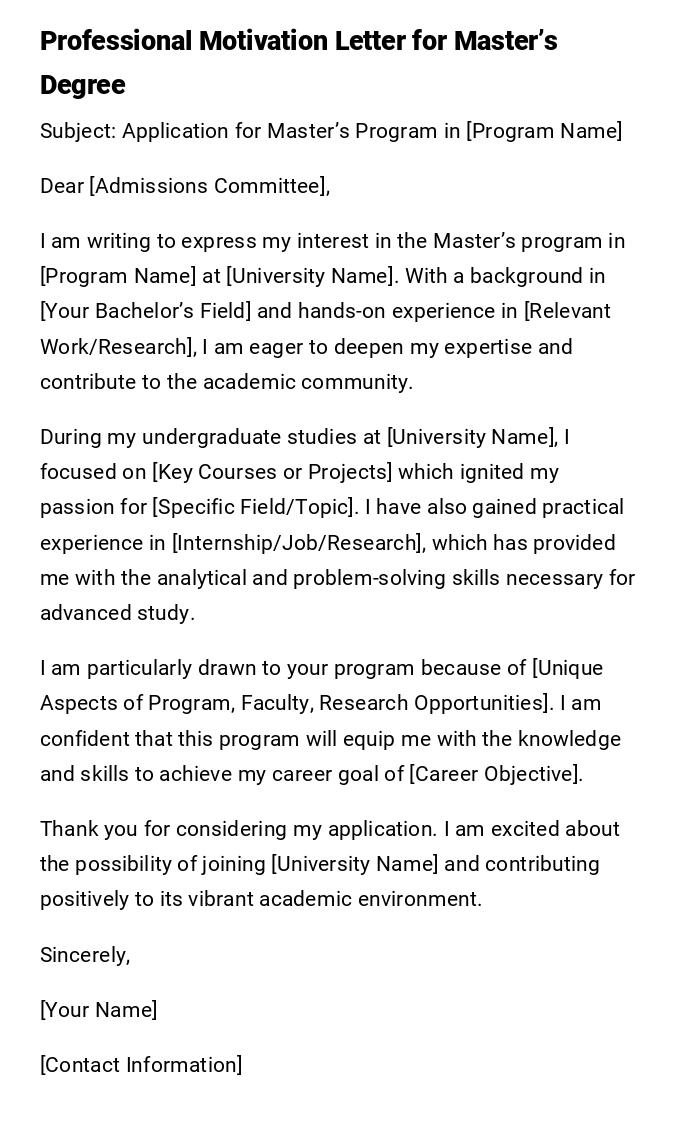
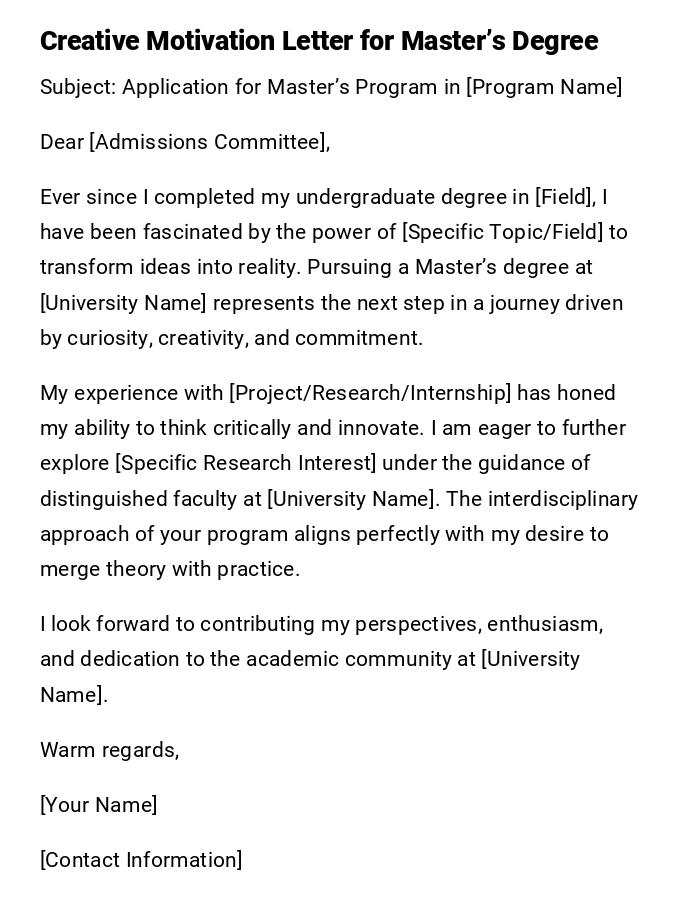
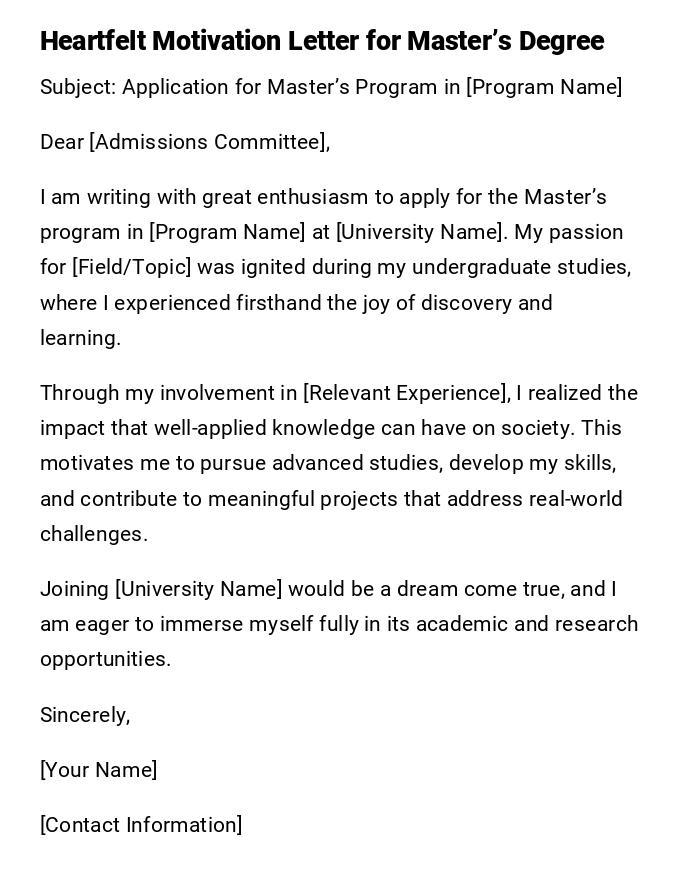
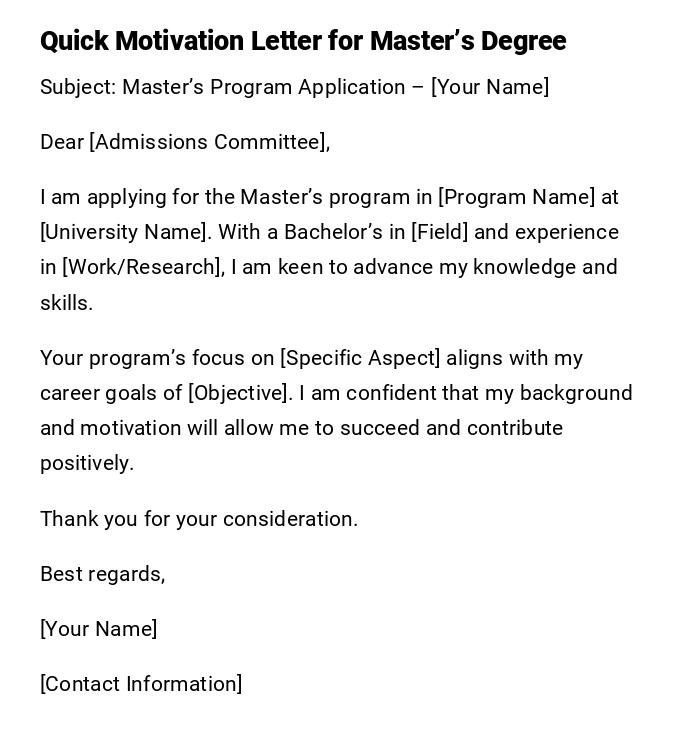
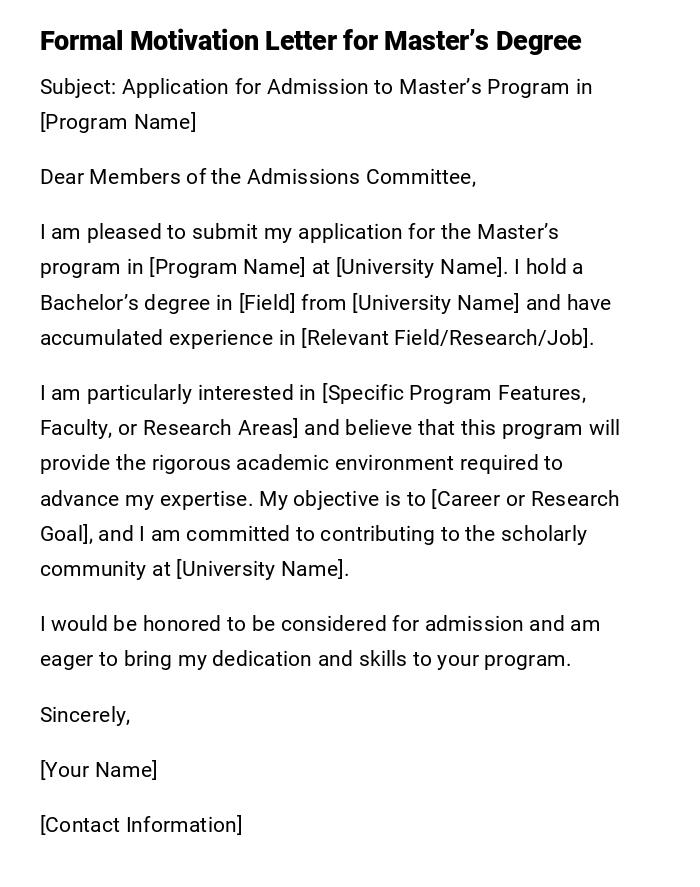

 Download Word Doc
Download Word Doc
 Download PDF
Download PDF